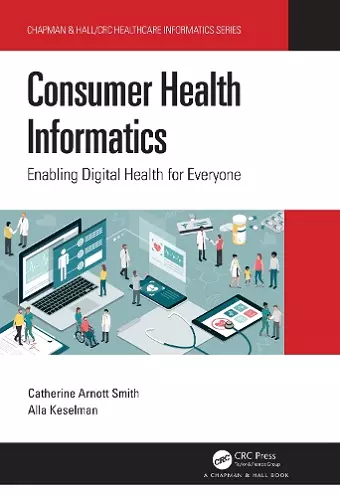Consumer Health Informatics
Enabling Digital Health for Everyone
Alla Keselman author Catherine Arnott Smith author
Format:Hardback
Publisher:Taylor & Francis Ltd
Published:14th Dec '20
Currently unavailable, and unfortunately no date known when it will be back
This hardback is available in another edition too:
- Paperback£44.99(9780367681548)

"An engaging introduction to an exciting multidisciplinary field where positive impact depends less on technology than on understanding and responding to human motivations, specific information needs, and life constraints."
-- Betsy L. Humphreys, former Deputy Director, National Library of Medicine
This is a book for people who want to design or promote information technology that helps people be more active and informed participants in their healthcare. Topics include patient portals, wearable devices, apps, websites, smart homes, and online communities focused on health.
Consumer Healthcare Informatics: Enabling Digital Health for Everyone educates readers in the core concepts of consumer health informatics: participatory healthcare; health and e-health literacy; user-centered design; information retrieval and trusted information resources; and the ethical dimensions of health information and communication technologies. It presents the current state of knowledge and recent developments in the field of consumer health informatics. The discussions address tailoring information to key user groups, including patients, consumers, caregivers, parents, children and young adults, and older adults. For example, apps are considered as not just a rich consumer technology with the promise of empowered personal data management and connectedness to community and healthcare providers, but also a domain rife with concerns for effectiveness, privacy, and security, requiring both designer and user to engage in critical thinking around their choices.
This book’s unique contribution to the field is its focus on the consumer and patient in the context of their everyday life outside the clinical setting. Discussion of tools and technologies is grounded in this perspective and in a context of real-world use and its implications for design. There is an emphasis on empowerment through participatory and people-centered care.
“An engaging introduction to an exciting multidisciplinary field where positive impact depends less on technology than on understanding and responding to human motivations, specific information needs, and life constraints”
-- Betsy L. Humphreys, former Deputy Director, National Library of Medicine
Matthew H Tepper, BS(Rocky Vista University College of Osteopathic Medicine)
**Description**
This book explains how consumers of healthcare can use health informatics and
digital health to take a more active role in their medical care. The first part
explains that healthcare is changing, allowing patients to take on more
responsibility for their health, and describes common problems consumers
encounter when looking for information and how consumers can best search for
information online. The second part goes into specifics about the different
digital health tools consumers can use to take a more active role in their healthcare.
**Purpose**
The purpose is to discuss the core concepts of consumer health informatics,
including a comprehensive summary of current knowledge and recent developments
in the field. The authors encourage consumers to use informatics to take a more
active role in their healthcare outside of the clinical setting. These are
worthy objectives considering medicine is shifting away from medical
paternalism and towards patient empowerment; at the same time, digital health
is becoming more accessible and user friendly. These objectives are thoroughly
met in this book.
**Audience**
The authors broadly state this book is for people who want to design or promote
information technology that helps people be more active and informed
participants in their healthcare. Additionally, this book may be of interest to
informed patients or to medical providers looking to help their patients take a
more active role in their healthcare. Both authors have a background in health informatics.
**Features**
The six chapters in the first part focus on the foundations of consumer health
informatics. This part establishes that there has been a shift to participatory
healthcare and goes on to explain how consumer health informatics can support
this shift. This section goes into detail about the best ways to search for
trustworthy and accurate medical information for all types of healthcare
consumers. Each of the five chapters in the second part focuses on a different
tool consumers can use to support their healthcare. These tools include
personal health records and patient portals, apps, smart medical homes, and
online patient communities. Each chapter explains the current state of the
technology and how to effectively use it in different scenarios. The book
concludes with a chapter on ethics focusing on direct-to-consumer genetics
products, like 23andMe.
**Assessment**
This quality book provides a thorough, detailed overview of consumer health
informatics and an introduction to growing digital health technologies
available to consumers. While the common theme is to encourage consumers to
take a more active role in their healthcare, the two parts of this book feels
like separate topics: consumer health informatics and digital health products.
Nevertheless, this book would be a great resource for someone interested in
either of these topics. It provides additional value by using many examples of
resources and technologies that have been vetted by the authors. Overall, this
book has many aspects that make it worth reading by anyone interested in
facilitating patient empowerment or using digital health tools.
-----------------------------------------------------------
Weighted Numerical Score: 89 - 3 Stars
ISBN: 9781138337459
Dimensions: unknown
Weight: 653g
250 pages